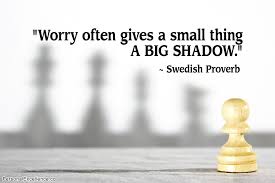Worry: How to Free Yourself
Posted on June 1st, 2016
What is worry?
Do you ever stew or ruminate about something that you or someone else has said? Or maybe you constantly ‘what if’ every possible decision. Well let me tell you something important… you have the ability to free yourself from worry. Worry can be very distressing and you can learn to manage it more effectively.
Worry is very future based and is all about making predictions about the future. Even when we worry about something that has happened in the past, we are really only concerned about how that will impact on us in the future.
Normal vs. Problematic worry
A lot of people ask me ‘isn’t worrying normal?’ Well the answer to that is yes, but there is a difference between normal versus problematic worry. For example:
Normal worry: I have to remember to get milk on the way home as I need it to make dinner tonight. Then I might think about it on and off throughout the day. I might even make myself a note.
Problematic worry: I have to remember to get milk on the way home. What happens if I don’t remember? We have people coming over for dinner and my partner specifically asked for that meal. Oh no, my partner will be so cranky with me and our friends will think I’m a fool and will never come over again.
Problematic worry is that ongoing loop that just seems to go around and around. We might even have imaginary conversations or fights with others. As a result we go on an emotional rollercoaster through an array of feelings, even though nothing has even happened.
What maintains worry?
Worry is maintained by what is referred to as the positive and negative beliefs. Basically, positive beliefs about worry are that it is beneficial or helpful in some way. For example, it helps to motivate me, keeps my organised or stops bad things from happening. Negative beliefs are that is uncontrollable or dangerous or harmful in some way.
So what can we do?
Worry is treatable and you can gain relief. A psychologist can teach you what creates worry and how to shut it down.
Some helpful tips to reduce worry:
-
Do not confuse worrying with problem solving.
Worry is NOT problem solving. Problem solving is active and progressive. Worry is stagnant and unhelpful.
-
Stop what if’ing.
What if’ing is not reality. It’s not helpful. It’s just a waste of good brain energy.
-
Understand that worry is not helpful.
You might notice that on the days where we don’t worry as much we usually have a much better day.
-
Learn to tolerate uncertainty.
Uncertainty = I don’t know how things will work out. Certainty = I do know how things will work out. Uncertainty is a part of life. Insisting on 100% certainty is like insisting that you want a pink unicorn…it simply doesn’t exist.
-
Don’t try and stop yourself having unwanted thoughts.
Yes you read this right. I’m telling you that trying to tell your brain to stop worrying or not to have certain thoughts will not work. For the brain to remember that it’s not allowed to think about something, it has to actually remember what it’s not allowed to think about. It’s self defeating. A psychologist will teach you how to change your relationship with those thoughts so your brain will get bored and let go of them anyway.
-
Limit when you worry.
Don’t tell your brain it’s not allowed to have certain thoughts, but you do have to limit when it does it. A psychologist will help you to create a ‘worry time’ which will limit your worry.
-
Learn how to challenge your thoughts.
Remember most worries are often not balanced. Learn how to ‘test the evidence’ and challenge these thoughts. Don’t simply accept all thoughts as true.
-
Be mindful.
We have already discussed mindfulness in a couple of previous blogs. Take time to go back and review them now. Mindfulness is a key strategy in learning how to free yourself from distress.
Worry can be overwhelming and make us feel like we are losing control, but it doesn’t have to be this way. Now is the best time to get relief. Act now and don’t waste anymore time caught up in these unhelpful thoughts.
“Worry never robs tomorrow of its sorrow, it only saps today of its joy”. Leo F. Buscaglia.
Written by Judy Travis

